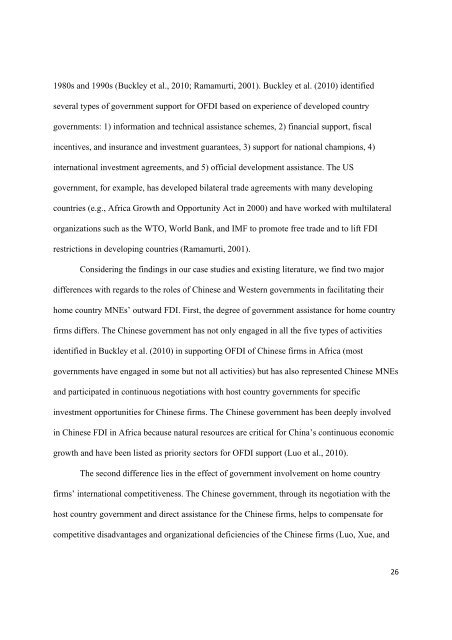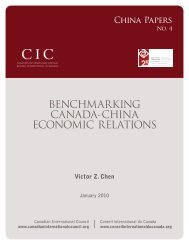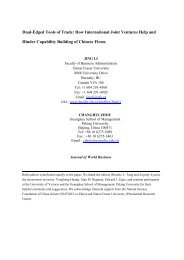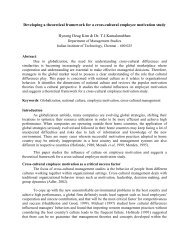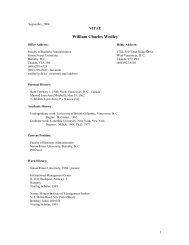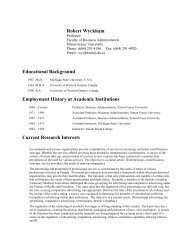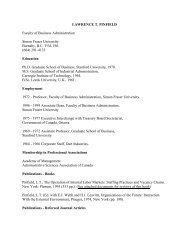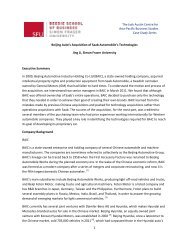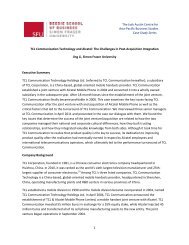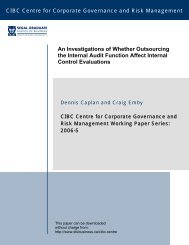Foreign Direct Investment in Natural Resource Industries in Africa ...
Foreign Direct Investment in Natural Resource Industries in Africa ...
Foreign Direct Investment in Natural Resource Industries in Africa ...
You also want an ePaper? Increase the reach of your titles
YUMPU automatically turns print PDFs into web optimized ePapers that Google loves.
1980s and 1990s (Buckley et al., 2010; Ramamurti, 2001). Buckley et al. (2010) identified<br />
several types of government support for OFDI based on experience of developed country<br />
governments: 1) <strong>in</strong>formation and technical assistance schemes, 2) f<strong>in</strong>ancial support, fiscal<br />
<strong>in</strong>centives, and <strong>in</strong>surance and <strong>in</strong>vestment guarantees, 3) support for national champions, 4)<br />
<strong>in</strong>ternational <strong>in</strong>vestment agreements, and 5) official development assistance. The US<br />
government, for example, has developed bilateral trade agreements with many develop<strong>in</strong>g<br />
countries (e.g., <strong>Africa</strong> Growth and Opportunity Act <strong>in</strong> 2000) and have worked with multilateral<br />
organizations such as the WTO, World Bank, and IMF to promote free trade and to lift FDI<br />
restrictions <strong>in</strong> develop<strong>in</strong>g countries (Ramamurti, 2001).<br />
Consider<strong>in</strong>g the f<strong>in</strong>d<strong>in</strong>gs <strong>in</strong> our case studies and exist<strong>in</strong>g literature, we f<strong>in</strong>d two major<br />
differences with regards to the roles of Ch<strong>in</strong>ese and Western governments <strong>in</strong> facilitat<strong>in</strong>g their<br />
home country MNEs’ outward FDI. First, the degree of government assistance for home country<br />
firms differs. The Ch<strong>in</strong>ese government has not only engaged <strong>in</strong> all the five types of activities<br />
identified <strong>in</strong> Buckley et al. (2010) <strong>in</strong> support<strong>in</strong>g OFDI of Ch<strong>in</strong>ese firms <strong>in</strong> <strong>Africa</strong> (most<br />
governments have engaged <strong>in</strong> some but not all activities) but has also represented Ch<strong>in</strong>ese MNEs<br />
and participated <strong>in</strong> cont<strong>in</strong>uous negotiations with host country governments for specific<br />
<strong>in</strong>vestment opportunities for Ch<strong>in</strong>ese firms. The Ch<strong>in</strong>ese government has been deeply <strong>in</strong>volved<br />
<strong>in</strong> Ch<strong>in</strong>ese FDI <strong>in</strong> <strong>Africa</strong> because natural resources are critical for Ch<strong>in</strong>a’s cont<strong>in</strong>uous economic<br />
growth and have been listed as priority sectors for OFDI support (Luo et al., 2010).<br />
The second difference lies <strong>in</strong> the effect of government <strong>in</strong>volvement on home country<br />
firms’ <strong>in</strong>ternational competitiveness. The Ch<strong>in</strong>ese government, through its negotiation with the<br />
host country government and direct assistance for the Ch<strong>in</strong>ese firms, helps to compensate for<br />
competitive disadvantages and organizational deficiencies of the Ch<strong>in</strong>ese firms (Luo, Xue, and<br />
26


